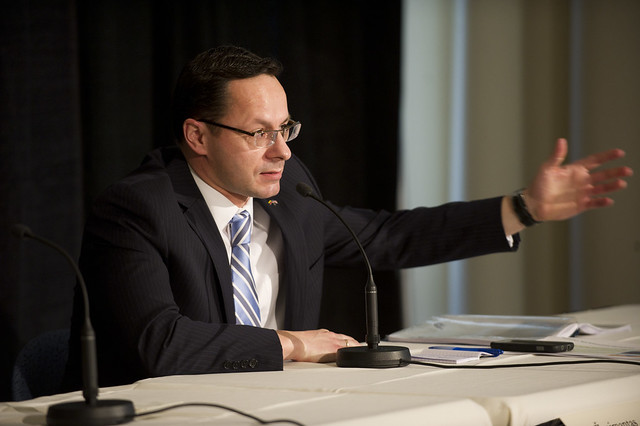Event Highlights: The EU Inside Out – A Panel Discussion with Žygimantas Pavilionis, Ambassador of Lithuania to the US, and Olexander Motsyk, Ambassador of Ukraine to the US
On March 19, the Center for the Study of Europe and the Center for Finance, Law, and Policy welcomed Žygimantas Pavilionis, Ambassador of Lithuania to the US, and Olexander Motsyk, Ambassador of Ukraine to the US, to a snowy Boston for the second event in a series of conversations with European Ambassadors taking place as part of a European Commission Delegation sponsored initiative entitled “The EU Inside Out.” For more information on the project, please see the write up of our March 5 event. Cornel Ban, Assistant Professor of International Relations at Boston University, introduced the Ambassadors, and Alan Berger, retired editorial writer for international affairs at the Boston Globe moderated the discussion.
In his opening remarks, Ambassador Motsyk, described Ukraine as a “young state” but an “old nation,” referring to the medieval state of Kievan Rus’, an integral part of Europe. Acknowledging the ups and downs his country has undergone since regaining its independence 21 years ago, he asserted unequivocally Ukraine’s aspirations to join the European Union. It is the first strategic priority of the current government of Ukraine, to which end, he said, it has implemented a number of systemic reforms to transform Ukraine into a prosperous, democratic state. In addition to new budget, tax, criminal, and procedural codes, an agreement on association and free trade with the EU has been completed and awaits ratification during the summit in Vilnius in November.
Motsyk went on to describe the other strategic priorities of his government, namely, its strategic partnerships with the United States and with Russia. Ukraine, he said, enjoys good relations with the United States, among the first countries to recognize Ukraine’s independence. He reminded listeners that in the early 90s Ukraine gave up the third biggest nuclear arsenal in the world and said that in addition to nuclear disarmament and non-proliferation, Ukraine is cooperating with the US on several other fronts, fighting against international terrorism, cyber terrorism, organized crime, human and drug trafficking, etc., as well as participating in US and NATO led peacekeeping operations around the world. In addition, he said, Ukraine is an important economic partner to the US and a major player in the world food market – the world’s largest exporter of sunflower oil and of barley, for example – producing twice as much agricultural product as it can consume. With Russia, with whom Ukraine shares so much in terms of culture, history, and tradition (to say nothing of familial and linguistic ties), Motsyk said his country seeks relations on the basis of equality and mutual interest. He explained that it will be easier to proceed in negotiations with the EU having good relations with Russia.
Taking the lead from his colleague and friend, Ambassador Motsyk, Ambassador Pavilionis described his own country’s deep European roots, its tumultuous history, and its emergence in recent years as one of the more successful economies in Europe. He noted his country’s ties to the United States, where large numbers of Lithuanians have immigrated over the years, as well as to the European Union, which Lithuania joined in 2004 and whose Presidency it assumes in July. He expressed his deep solidarity with Ukraine, with whom Lithuania shares much of recent history and whose EU cause he supports enthusiastically. Sympathetic to Urkaine’s struggles, he described Lithuania’s transition to a free market economy in terms of “getting rid of Soviet cancers, corruption, and state aid,” noting that after signing its own association agreement with the European Union in 1995, Lithuania’s GDP increased by a factor of 6. Perhaps the most important point that Ambassador Pavilionis made was in reference to Ukraine’s pending agreement with the EU, where he argued for the importance – in cases of corruption, in particular – to personally target and punish individuals, not whole countries. Ukraine’s 50 million citizens deserve to be a part of Europe, he asserted, whatever the foibles of that country’s leaders. In conclusion, he expressed his eagerness for a comprehensive trade agreement between the European Union and the United States. Dismantling the remaining barriers, he argued, will benefit citizens on both sides of the Atlantic, and will help the EU and the US to withstand pressures from emerging global powers.
A lively discussion ensured during which the Ambassadors addressed questions on issues including the purported “loss of local democratic powers” in Cyprus, where Russian deposits were recently confiscated; Ukraine’s disputes with Russia over the price it pays for Russian gas and the geopolitical (and environmental) consequences of shale development in Ukraine and Lithuania; the conditions Ukraine must meet if the aforementioned association agreement is to move forward and diminishing trust of Ukraine in light of recent reports from EU observers; and finally, to Ukraine’s NATO membership. In their responses to the various questions, both Ambassadors stressed the need for standards (in Cyprus, for example), and again, in cases of wrongdoing, the need to punish individuals and not whole countries. They stressed the strategic importance of energy independence for both countries, and the need to balance security, economic and environmental concerns. The Ambassadors regard for one another was evident, underscoring the importance of “friendship,” for relationships based on “mutual understanding” and not only “strategic importance.”
Approximately 70 people braved the weather last Tuesday to meet Ambassador Motsyk and Ambassador Pavilionis in person. If you didn’t make it, you can catch the discussion on BUniverse.

